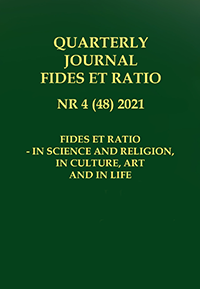Abstract
Despite the passage of 20 years since the opening of the archives of the former SB, historians have not developed the principles of criticism of SB files as historical sources, which is conducive to the so-called playing with folders, and consequently the destruction of historical narrative and social life. Among researchers and publicists, an affirmative attitude towards the SB files has been created, causing their criticism to be ignored.
Researchers ignore the requirement to separate the theoretical-ideological and rhetorical layers of SB operational files. They also neglect to study the credibility of their authors.
Rafał Łatka gave a justification for the affirmative attitude to the SB files. It has been shown that this justification is logically erroneous, and the affirmative attitude to the SB files is contrary to the rational concept of the historical source and to the examples of the lack of credibility of these files.
Several ways of creating questionnaires to examine the credibility of SB files were proposed. The first question that was proposed: Was the work of officers and their superiors in the field of interest to the researcher focused on efficiency or on the statistics of results? Further proposals suggest questions about the internal control of the case under investigation.
It was justified that it is not enough to state the fact of registration of a given person by SB as a collaborator, because it is necessary to demonstrate specific cooperation.
It was justified that the reliability of a note decreases exponentially as a function of the number of intermediaries between it and the facts.
The need to ask about the intentions of the officers doing reports, which could be related to their professional careers, the expectations of superiors, the need to demonstrate results, etc., was indicated. The need to investigate deviations of the examined case from the ideal instructional pattern was also indicated.
Studies of the reliability of files have their ethical aspect. Studies that may threaten good name of the persons concerned should meet the highest methodological standards and be guided by the principle of in dubio pro reo.
References
Bereszyński, Z. (2012). Akta SB nie kłamią, ale mogą wprowadzić w błąd. Z badań nad dokumentami dotyczącymi osobowych źródeł informacji SB, Pamięć i Sprawiedliwość, 2 (20), 421-436.
Brzechczyn, K. (2012). Problem wiarygodności teczek i opartej na nich narracji historycznej. Kilka uwag metodologicznych, Pamięć i Sprawiedliwość, 11/2 (20), 53-77.
Brzechczyn, K. (2014). The Reliability of “Files” and Collaboration with the Security Service (SB) in Poland: An Attempt at a Methodological Analysis, Hungarian Historical Review, 3, 2, 257–284.
Cenckiewicz, S. (2015). Krzywda i thriller arcybiskupa Wielgusa (wersja rozszerzona), Do Rzeczy, 3, from: https://dorzeczy.pl/kraj/5318/krzywda-i-thriller-arcybiskupa-wielgusa-wersja-rozszerzona.html (access: 24.09.2021).
Collingwood, R.G. (2014). The Idea of History, Eastford: Martino Fine Books.
Domańska, E. (2016). Jerzy Topolski. Bardzo krótkie wprowadzenie, (in:) Jerzy Topolski, Teoretyczne problemy wiedzy historycznej. Antologia tekstów, 7-35, Poznań: Wydawnictwo Nauka i Innowacje.
Grajewski, A., Machcewicz, P., Żaryn, J. (2005). Raport: Sprawa o. Konrada Hejmo. Działania służby bezpieczeństwa przeciwko Kościołowi katolickiemu w latach 1975–1988, from: https://ipn.gov.pl/download/1/1319/1-1888.pdf, (access: 17.07.2021).
IPN (2017). Informacja dotycząca opinii biegłych na temat akt TW „Bolka”, from: https://ipn.gov.pl/pl/dla-mediow/komunikaty/38559,Informacja-dotyczaca-opinii-bieglych-na-temat-akt-TW-Bolka.html (access: 24.08.2021).
IPN (2017a). Biegli z Instytutu Ekspertyz Sądowych potwierdzają, kto pisał donosy TW „Bolka”, from: https://ipn.gov.pl/pl/aktualnosci/38564,Biegli-z-Instytutu-Ekspertyz-Sadowych-potwierdzaja-kto-pisal-donosy-TW-Bolka.html (access: 24.09.2021).
Karp, H. (2018). Media totalitarne. „Przegląd Katolicki” – historia jednej redakcji. Służby bezpieczeństwa jako przykład kontroli systemu informacyjnego Polskiej Rzeczpospolitej Ludowej w latach 1983–1988, Warszawa: Hanna Karp.
Kłeczek, M. (2017). Na kogo donosił „Bolek”? Poszkodowani związkowcy ze stoczni, from: https://www.tvp.info/28866630/na-kogo-donosil-bolek-poszkodowani-zwiazkowcy-ze-stoczni, (access: 24.09.2021).
Koller, S. (2012). Normatywne zasady brakowania i niszczenia materiałów Służby Bezpieczeństwa w Ministerstwie Spraw Wewnętrznych (1956–1990), Pamięć i Sprawiedliwość, 11/2 (20), 331-358.
Lasota, M. (2003). O raporcie sejmowej komisji poświęconym samodzielnej grupie „D” w MSW, Biuletyn Instytutu Pamięci Narodowej, 1 (24), 27-56.
Leszczyński, A. (2006). Anatomia protestu. Strajki robotnicze w Olsztynie, Sosnowcu i Żyrardowie, sierpień–listopad 1981, Warszawa: Wydawnictwo TRIO.
Łatka, R. (2016). Problemy metodologiczne w prowadzeniu badań na temat historii Kościoła katolickiego w Polsce „ludowej”. Przegląd badań, postulaty badawcze, Dzieje Najnowsze, Rocznik XLVIII, 1, 221-231.
Łatka, R., Musiał, F. (2020). ”Dialog należy kontynuować…”. Rozmowy operacyjne Służby Bezpieczeństwa z ks. Henrykiem Gulbinowiczem 1969–1985. Studium przypadku, Warszawa–Kraków: Instytut Pamięci Narodowej.
Malczewski, S. (2009). „Metodologie” Jerzego Topolskiego, Historyka, T. XXXIX, 89-120. Musiał, F. (2015). Podręcznik bezpieki, Kraków: Wydawnictwo Avalon.
Polak, W., Suleja, W. (2021). Pytania, które nie zostały zadane… „Dialog należy kontynuować…” Rozmowy operacyjne Służby Bezpieczeństwa z ks. Henrykiem Gulbinowiczem z lat 1969–1985. Studium przypadku, wybór, wstęp, oprac. R. Łatka, F. Musiał, Warszawa–Kraków: Instytut Pamięci Narodowej.
Stobiecki, R. (2013). Historyk wobec etyki. Szkic niezobowiązujący, Rocznik Antropologii Historii, 1 (4), 307–319.
Suleja, W. (2008). Złudny czar teczek, czyli „teczkowe grzechy główne”, (w:) K. Persak, A. Friszke, Ł. Kamiński, P. Machcewicz, P. Osęka, P. Sowiński, D. Stola, M. Zaremba (red.), Od Piłsudskiego do Wałęsy. Studia z dziejów Polski w XX wieku, 512-516, Warszawa: Instytut Pamięci Narodowej.
Topolski, J. (2016). Teoretyczne problemy wiedzy historycznej. Antologia tekstów, Poznań: Wydawnictwo Nauka i Innowacje.
Zaranek, Ł. (2016). Na nich donosił TW „Bolek”. „Wynagrodzenie brał bardzo chętnie”, from: https://www.tvp.info/24141414/na-kogo-donosil-tw-bolek (access: 24.09.2021).

